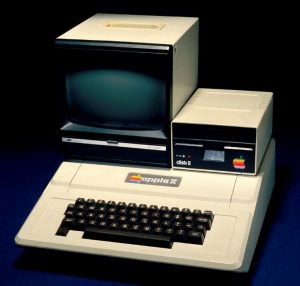Why could you say that the “Indie” game scene is not a new thing and explain, give examples?
&
Has the Term “Indie” Become Meaningless?
Question One:
To look back at the earliest days of gaming, the only video games would be found in arcades, developed, published and distributed by the likes of Namco, Service Games and Atari. The size and expense of these cabinets meant that to produce a game for them you’d have to join one of the companies and hope to get your idea developed. However, in the late 1970s and 80s, things began changing, with the release of the inexpensive home computers like the ‘Apple 2’.  (Smithsonian, n.d.)
(Smithsonian, n.d.)
This gave hobbyist developers a way to get their hands on tools powerful enough and affordable enough to make their own games, without having to join a corporate company.
Indie game development, took a big blow in the latter half of the ‘80s, with the rise of the NES and the Sega Master System. In order to develop for these systems, developers needed to get official licensing, and the costs involved meant indie development would be confined to PCs. However, with the improvement of the home computer in terms of power, the development tools also progressed. By the late ‘90s, hobbyists had more tools than ever imaginable.
The 2000s would see the popularity rise of Indie games, with the explosive popularity of games like Mojang’s “Minecraft”, Team Meat’s “Super Meat Boy” or Behemoth’s Castle Crashers. With platforms like Flash, Unity or XNA Game Studio, this allowed more people to develop freely. These platforms began the march towards consoles for Indie Games. While most games released in this time were from major publishers, downloadable game stores made some room for Indie Games. The progress of which can be seen within Indie Game the Movie, through the struggles of the developers of Super Meat Boy and Phil Fish’s “FEZ”. (Indie Game The Movie, 2012).
Question Two:
To answer this question we need to look at where Indie Games are today. Currently, it is just as easy to find yourself an indie game that suits your taste, as it is to find AAA games. In actuality, a person may argue that there is an ever-expansive glut of indie games out there, being released consistently. Thanks to services like Humble Bundle or Steam Greenlight, you can find these with ease. They may not share the physical store sales that your AAA releases have, but they can often be just as successful.
The indie game genre, has become so strong and large, that some developers choose now to go independent to release games at a more rapid rate, instead of staying with big companies, for example IO Interactive has been reported to have broken away from Square Enix, to continue publishing Hitman games, solo (D, 2017). This is only one report of this, Developers from series like BioShock and Metal Gear Solid have also done similar moves.
It is clearer now, more than ever, that the indie game scene is not just another part of the regular gaming scene. Even though they did have a rocky start, they are now part and parcel of the community. Dominating entire markets, their sales trample some AAA titles. Breathing fresh life into a repetitive market.
References
Bomb, G. (n.d.). Retrieved from https://www.giantbomb.com/io-interactive/3010-3562/
CBSNews. (2013, February 9). Preview: The Last of US. Retrieved from CBS News: https://www.cbsnews.com/news/preview-the-last-of-us/
D, B. (2017, June 20). Hitman Episode 1: ICA FAcility Free Download Available on PS4, PC, Xbox One. Retrieved from One Angry Gamer: https://www.oneangrygamer.net/2017/06/hitman-episode-1-ica-facility-free-download-available-on-ps4-pc-xbox-one/33425/
FrictionalGames. (2017). In the Games of Madness. Retrieved from http://frictionalgames.blogspot.co.uk/
Indie Game The Movie (2012). [Motion Picture]. Retrieved from https://vimeo.com/ondemand/indiegamethemovie/25268139
Lebowitz, J. (2011). Interactive Storytelling for Video Games.
McMullin, K. (2014, April 24). Passive vs. Active Participants. Retrieved from Collegewise: http://wiselikeus.com/collegewise/2014/04/passive-vs-active-participants.html
Playstation. (n.d.). The Last of Us Remastered. Retrieved from Playstation: https://www.playstation.com/en-gb/games/the-last-of-us-remastered-ps4/
Smithsonian. (n.d.). Apple 2 Personal Computer. Retrieved from National Museum of American History: http://americanhistory.si.edu/collections/search/object/nmah_334638

